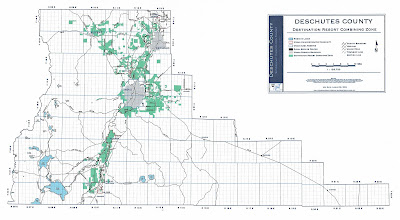As Deschutes County
With development of the new “2010” comp plan underway, several recent county planning decisions have highlighted conflicts involving the issue of when a resort is a resort, and when it’s mostly a rural subdivision.
There have been changes over the years to the 1979 plan but this would be the first major revision.
Entwined in the discussion is the pivotal role of resorts in Central Oregon ’s largely tourism based economy, and how to balance their location with existing agriculture, forest and open space lands.
Counties now must “map” potential resort locations, and since 2003 are permitted to review their resort maps once every 30 months. The mapping process, although independent of redrafting the county comp plan, nevertheless is intended to ultimately reflect its provisions.
For Deschutes County
However, a notable exception is the Sisters golf subdivision, Aspen Lakes Aspen Lakes
Elsewhere in Central Oregon there is another twist to permitting resorts. In Jefferson County 2009 state legislation banned one proposed resort and reduced the size another in the Metolius Basin near Camp Sherman Oregon
Another bill that would have banned new resorts in Deschutes County
A spate of new resorts were underway in the last decade, along with others on the drawing board. The collapse of the real estate market lead some developers to test county and state requirements that at least 50 nightly rental units be completed before individual homesites could be sold.
The resort regulations also require a ratio of one nightly rental unit for each permanent residence.
County officials and conservation groups have voiced concern over recently proposed legislation that would effectively preempt state and county regulations pertaining to rural subdivisions and resorts.
But the flip side, say some observers, is the situation in the Metolius basin wherein legislation stopped resorts that had met the approval of Jefferson County
In one example a proposed bill would apply specifically to 1,500 acres adjacent to the existing Aspen Lakes
However, another legislative bill would apply to the effort of Sunriver Resort’s ownership group to build a subdivision, known initially as Pine Forest Deschutes River south of Bend
In exchange for approval of 925 homesites, with no requirement for nightly lodging, the Sunriver group has offered to contribute $3 million toward a waste treatment facility to mitigate existing nitrate problems from septic systems in the area.
As of early March there were five “Goal 8” approved resorts in Deschutes County Inn of the 7th Mountain, which are controlled by other state regulations.


